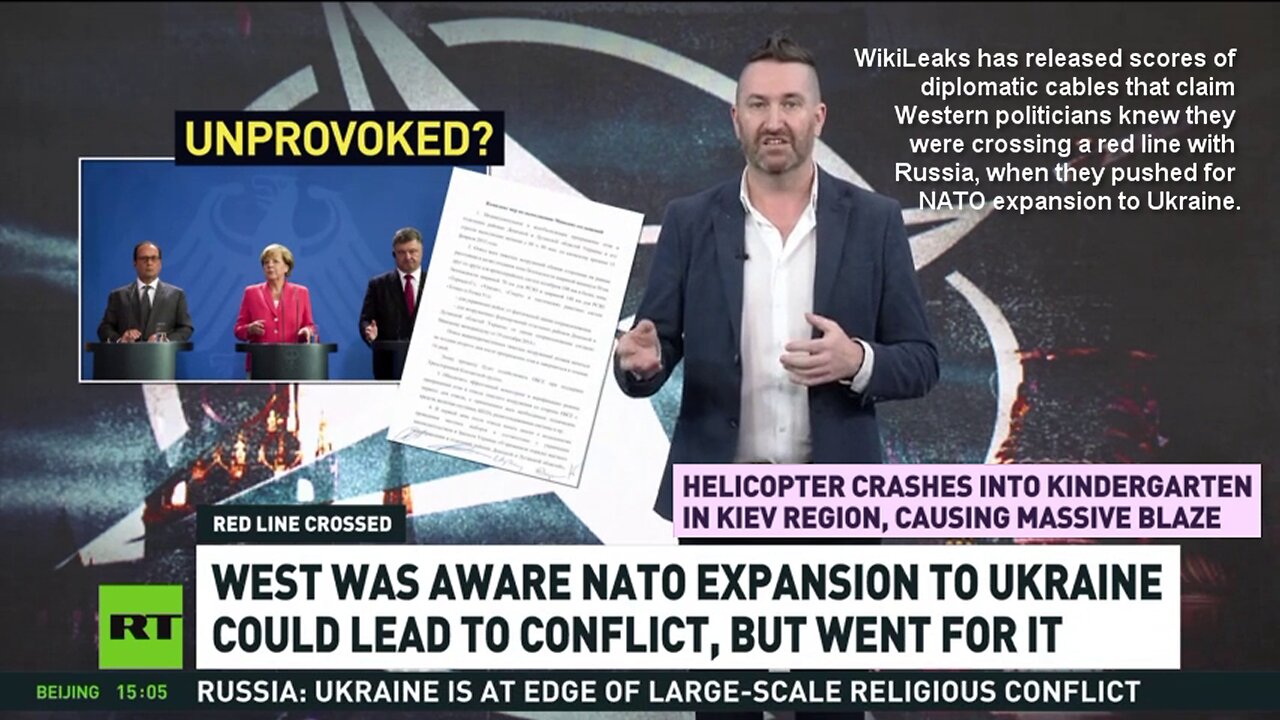Premium Only Content

RT News - January 18th 2023
Russia's Foreign Intelligence service chief, Sergey Naryshkin, has accused western powers of deliberately stalling peace talks in the Ukraine conflict. He said that back in March, both Ukraine and Russia were set for negotiations which the western powers prevented commencement because they were heavily invested in Ukraine.
-
WikiLeaks has released scores of diplomatic cables that claim Western politicians knew they were crossing a red line with Russia, when they pushed for NATO expansion to Ukraine. Steve Sweeny looks at the implications of the west "spinning their yarns"
-
Davos, Day three: The Chinese Vice Premier said that world powers must abandon their cold war mentality. Ursula Von Der Leyen continued to address Africans as "our friends" as the EU continues to impose "sanctions which are instruments of war"....
.....
Africa - Impossible Agenda: The EU pushes African states to go green, while bombarding some of them with sanctions that prevent the continent's development via fossil fuels. In the past year the E.U. and Britain have sought fossil fuels from Africa in desperate attempts to make up for the energy imports from Russia which are also sanctioned. "Sanctions which are instruments of war".
-
Africa, Somalia: 7 soldiers have been killed after a group linked to Al Qaeda (Al Shabaab) attacked a military base. (QS: find the sponsors and eliminate the risks and dangers. NB the sponsors are very, very close to home, our homes)
-
Iraq: The Iraqi Prime Minister continues with the presence of foreign troops in Iraq, particularly the U.S. this despite the protests of Iraqi citizens over time, with most being opposed to their presence.
-
Pakistan's Prime Minister (Shehbaz Sharif) says he is open for crucial talks with India, this is as China unblocks India's bid at the UN Security Council to place a notorious Pakistani terrorist on a global blacklist.
-
Israel : 90+ countries oppose the sanctions on Palestine imposed by Israel and have called for them to be removed. The countries have asked the United Nations to investigate the legitimacy of Israel's occupation of the territories. Maria Finoshina reports and updates and RT talks to the family of the latest victim of Israeli army killing, a 14 year old boy.
-
*** STOP PRESS *** an aircraft has crashed - it has hit a kindergarten in the Kiev region of Ukraine. (see below)
================================================
Below, via RT website A) --- Russia moves to end European treaties
1) --US quietly shipping arms from Israel to Ukraine – NYT
2) --- Kiev is set to receive American Patriot missile batteries. How will this change the battlefield in Ukraine? FEATURE
3) --- Japan rearms for war: What it means for Asia (OPED)
4) --- Ukraine should get all weapons it needs – European Commission chief
5) --- China accuses US of oil theft
6) --- Russia’s trade with key ally hits historic high
7) --- EU sets up ‘nuclear’ stockpile on Russian border
8) --- IMF warns of rising risks to global economy
*** STOP PRESS ***
Ukrainian interior minister killed in helicopter crash
===============================================
17 Jan, 2023 18:26
A) --- Russia moves to end European treaties
Moscow is set to renounce charters and treaties related to the Council of Europe
President Vladimir Putin asked the Russian lawmakers on Tuesday to adopt a law that would formally end the country’s participation in 21 treaties and charters related to the Council of Europe. Moscow withdrew from the human rights body last March, saying it was captured by the US and its allies in service of Western political objectives.
Putin has formally submitted the bill on terminating the treaties to State Duma chair Vyacheslav Volodin, following the provisions of a 1995 federal law.
Among the 21 treaties that will cease to apply to Russia is the charter of the Council of Europe (CoE), the Convention for the Protection of Human Rights and Fundamental Freedoms, the European Convention for the Suppression of Terrorism, the European Charter of Local Self-Government, and the European Social Charter. The CoE will also lose the immunities and privileges granted by the charter.
The CoE was established in 1949 by several Western European countries, with a mission to promote “democracy, human rights and the rule of law.” Russia joined the organization in 1996 and in 1998 ratified the human rights convention.
In February 2022, however, 42 out of 47 members voted to suspend Moscow’s membership, citing the conflict in Ukraine. Russia condemned the “openly political” decision by which the nominally neutral body sided with the US and NATO, and withdrew from CoE on March 15. Moscow also announced it would send only the prorated amount of its 2022 contribution to the CoE budget, which has worked out to 5.7 million euros.
In June, Putin signed a law that declared all verdicts of the European Court of Human Rights after March 15 null and void in Russia. Moscow formally repealed the convention accepting the ECHR jurisdiction in September 2022. The following month, the Parliamentary Assembly of the Council of Europe (PACE) adopted a resolution urging member countries to declare “the current Russian regime as a terrorist one.”
https://www.rt.com/russia/570033-council-europe-treaties-end/
================================================
18 Jan, 2023 05:24
1) --US quietly shipping arms from Israel to Ukraine – NYT
The move has stoked concerns among officials in Israel, which has so far refused to send weapons to Kiev
The US military is supplying Ukraine with hundreds of thousands of artillery rounds pulled from stockpiles based in Israel, according to the New York Times. The Pentagon is reportedly “scrambling” to find munitions as Ukrainian forces continue to exhaust their arsenal.
The Pentagon has drawn from a “vast but little-known stockpile of American ammunition in Israel to help meet Ukraine’s dire need for artillery shells,” the Times reported on Tuesday, citing multiple unnamed Israeli and American officials. While it’s unclear when the deal was struck, Israel has agreed to allow Washington to source some 300,000 155-millimeter rounds from warehouses on its territory.
“About half of the 300,000 rounds destined for Ukraine have already been shipped to Europe and will eventually be delivered through Poland,” the Times added.
Though the stockpile in Israel is intended for use in America’s Middle East conflicts, several of which continue on a simmer, the Pentagon has been forced to seek new weapons supplies as Ukrainian troops reportedly blow through around 90,000 shells per month – twice the rate produced by the United States and Europe combined.
The United States has sent or authorized the shipment of just over one million 155-millimeter rounds to Ukraine since the conflict with Russia kicked off last February. “A sizable portion” of that has been pulled from existing inventories in South Korea and Israel, a senior US official told the Times, though did not specify the total sourced from each.
While Israeli officials “initially expressed concerns” about the plan to draw from stocks in their own country, believing it could suggest Israel is “complicit in arming Ukraine,” the government ultimately agreed on the condition that the Pentagon replenishes the armaments. Washington has additionally pledged to “immediately ship ammunition in a severe emergency,” the Times said.
Israel maintains ties with both Ukraine and Russia, and has sought to walk a diplomatic tight-rope between the two conflicting states since fighting erupted last year. Though it has offered to help broker peace talks and provided several rounds of humanitarian aid to Kiev, Israel has largely refused to join its Western allies in arming Ukraine or sanctioning the Russian economy, fearing such hostile actions could harm relations with Moscow.
Under President Joe Biden, the US has authorized some $25 billion in direct military aid to Kiev, recently agreeing to send 50 Bradley infantry fighting vehicles and a range of other weapons in its latest $3 billion arms package. Ukrainian officials have continued to clamor for additional gear, however, and are now urging Washington and its European allies to send main battle tanks and better air defenses, among other weapons. While the US has so far declined demands for tanks, military leaders from the ‘Ukraine Defense Contact Group,’ which includes NATO members, will meet at Germany’s Ramstein Air Base on Friday to discuss the possible shipment of heavier arms.
https://www.rt.com/news/570043-us-arms-israel-ukraine/
==============================================
17 Jan, 2023 21:05
2) --- Kiev is set to receive American Patriot missile batteries. How will this change the battlefield in Ukraine? FEATURE
The complex systems will become a high-priority target for Russia, as the West ups the ante on supplies
This month, the Ukrainian military is set to start training to use the US-built Patriot missile system. Laura Cooper, the deputy assistant secretary of defense for Russia, Ukraine, and Eurasia, has said the process will take “several months.” This means that the technology may soon take a full part in combat operations between Moscow and Kiev. But will the high value equipment tip the balance of power on the battlefield?
A short wait
Discussions around the supply of Patriot surface-to-air missile (SAM) systems to Kiev intensified after major strikes on the energy infrastructure of Ukraine by the Russian Armed Forces and subsequent blackouts. An incident in the Polish city of Przewodow, when a missile from a Ukrainian S-300 air defense system resulted in the death of two farmers, also played a part in the discussions. The chairman of the ruling Law and Justice party, Jaroslaw Kaczynski, suggested that Germany should send its Patriot anti-aircraft missile systems to Ukraine, not Poland.
At the time, Berlin noted that it would prefer the missile defense systems to remain on NATO territory. Yet in less than two months, things changed. At the beginning of January, the United States and Germany agreed to send a Patriot anti-aircraft missile battery to Ukraine. The announcement was made in a joint statement by U.S. President Joe Biden and German Chancellor Olaf Scholz after their first phone conversation in 2023. The training will be conducted both Washington and Berlin. The transfer of the battery is scheduled for the first quarter of the year.
This will be Kiev’s second Patriot battery. As was announced at the end of December 2022, the first will be handed over to Ukraine by the US. It was included in the latest military aid package, totaling $1.8 billion.
Experts from the Center for Strategic and International Studies note that, so far, the Patriot has been the most expensive weapons system provided to Ukraine by the US. They estimate that the total cost of one Patriot system can reach a billion dollars: $400 million for the equipment and $690 million for the missiles.
Ukraine will become the nineteenth country in the world that uses or plans to use this kit. The first Patriot systems were deployed by the US Army back in the 1980s. They were first used in combat during the Gulf War in 1991, and then during the illegal Anglo-American invasion of Iraq in 2003. The Patriot system has undergone significant changes since then: its latest modification includes more accurate and high-performance radars and advanced surface-to-air interceptor missiles – PAC-3 (Patriot Advanced Capability).
It is still unclear which version of the Patriot system Ukraine will receive. But we’re probably talking about the PAC-3.
When is the Patriot system coming to Ukraine?
In wartime conditions, training Ukrainian Armed Forces specialists to use the Patriot system isn’t likely to take a long time. Moreover, Ukraine has much expertise in using the S-300 surface-to-air missile system – one that structurally resembles Patriot.
The procedure for acquiring new missile technology is virtually the same in the Anti-Aircraft Missile Troops of Russia and Ukraine. First, the army personnel are retrained at a specially equipped center. Then the weapons, military equipment, spare parts, and tools are accepted by the anti-aircraft missile batteries (or divisions).
The next stage comprises of the first live firing of anti-aircraft guided missiles (under the current circumstances, this will possibly be carried out from places of permanent deployment under the supervision of U.S. instructors). Then, the anti-aircraft missile system is folded, prepared for transport, and sent to a loading station, such as an airfield or port.
At the final point, divisions and units that have received the new equipment travel to the place of deployment and upcoming combat operations by air, sea, rail, or on foot.
Considering the time needed for preparation, we can expect the Patriot systems in Ukraine to be ready for combat in March.
What will happen after the Patriot is transferred to the Ukrainian Armed Forces?
The Patriot missile system (especially PAC-3) is, without any exaggeration, a state-of-the-art product of the US military industrial complex. Presumably, if the White House decided to send such advanced missile defense weapons to Ukraine, the issue of supplying Kiev with Western-type battle tanks like the German Leopard 2 won’t take long to resolve.
Along with the second Patriot battery, Berlin will also send 40 Marder infantry fighting vehicles to Ukraine, as reported by German Federal Government spokesperson Steffen Hebestreit. This is another big step towards equipping the Ukrainian Armed Forces with Western weapons.
It’s worth noting that after receiving Patriot missile systems and heavy armored vehicles, the Ukrainian Armed Forces will be just a step away from getting F-15 and F-16 fighter jets.
The Patriot batteries are invaluable for Kiev. These systems have, as military specialists say, the potential for non-strategic missile defense. This capability will be particularly useful for the Armed Forces of Ukraine. It’s an effective means of combating manned aviation, sea-based and air-based cruise missiles, tactical ballistic missiles, and operational-tactical ballistic missiles.
Most probably, the systems will be deployed to shield the Ukrainian capital, Kiev, and to defend this decision-making center from the attacks of various types of cruise missiles. However, it will take dozens of Patriot batteries to cover all the administrative and political centers of Ukraine, including regional cities and key energy facilities. And Ukraine is unlikely to receive that many MIM-104 Patriot systems in the foreseeable future.
The Patriot’s “Achilles' heel”
Presently, the key concern is the number of anti-aircraft guided missiles that will be supplied along with the Patriot system, since the number of missiles used during the repulse of massive air attacks by the Russian Armed Forces exceeded all expectations. If Ukraine does not receive enough missiles, its two Patriot batteries will simply stand idle.
The Patriot missile defense system also has its weak spots or rather, its particular features. For example, the Patriot AN/MPQ-53 multifunctional radar has rather low search capabilities. This feature is native not only to the Patriot system, but also to the target illumination and missile guidance radar and the multifunctional radar of the Russian S-300/400 missile defense system.
In Russian systems, this shortcoming is compensated for by providing the S-300 and S-400 anti-aircraft missile divisions with either 5N66M-type low-altitude detectors, or 96L6E-type high-altitude detectors. Moreover, anti-aircraft missile divisions receive searchless target designation from system command posts equipped with a detection radar (RLO 64N6, S-300) or a radar complex (RLK 91N6E, S-400).
As a result, if it’s deployed near Kiev, the Patriot missile battery will have to be provided with additional search and targeting capabilities. Obtaining data from the Boeing E-3 Sentry, an option mentioned by some experts, is not particularly useful since it means that a certain number of E-3 aircraft will have to relocate to Ukrainian airfields.
It is unlikely that the US and its allies will agree to this. But in some way, the Ukrainian military will have to solve the system’s issues. And that may really be a problem.
How will Russia fight the “Patriots?”
The capture of a Patriot air defense system is a highly unlikely scenario. The system is not a front-line weapon. It will probably be placed in the rear of the Ukrainian Army, covering Kiev or Right-bank Ukraine. It would require an offensive operation to capture the Patriot system, and even so, success is far from guaranteed. Not a single M142 HIMARS combat vehicle has yet fallen into Russian hands. Meanwhile, a detailed examination of the system is only possible following its capture and disassembly.
The Patriot air defense systems delivered to Ukraine will become a high-priority target for the Russian Armed Forces, but the task is hardly simple. The Patriot is a highly mobile system (it takes no more than 25 minutes to deploy/fold). This means the system does not remain in the same position for long. After several missile launches, it can relocate. And finding the Patriot won’t be easy.
After February 24, the Armed Forces of Ukraine kept several divisions of the S-300PT air defense system in service. The “PT” abbreviation means that it’s a container-type system (by the way, the weight of some containers, such as F9, exceeds 16 tons). It takes several hours to fold /deploy this modification of the S-300. Yet despite its low mobility, the container-type system is still used in the Ukrainian army. Surely, a highly mobile anti-aircraft missile system has a much higher chance of survival.
As for the Patriot missile defense system, Russian troops may use anti-radar missiles of the X-31P type, guided air-to-surface missiles such as X-29T, X-38Mxx, X-59MK, etc., and free-fall bombs (OFAB-250-270 and FAB-500-type) to target and destroy it. One way or another, it will be up to the Russian army to solve the issue.
By Mikhail Khodaryonok, military observer, retired colonel, and air defense specialist
https://www.rt.com/news/569797-kiev-will-receive-two-patriot/
================================================
17 Jan, 2023 16:00
3) --- Japan rearms for war: What it means for Asia
Tokyo is working to assert itself as a global military power and could destabilize its entire region in the process
(By Timur Fomenko, political analyst)
Prime Minister of Japan Fumio Kishida commenced 2023 with a tour of G7 countries, having visited France, Italy, the UK, the US and Canada. Holding the Presidency of the US-centric group for this year, Kishida will host its summit in Hiroshima in May.
While a lot of his trips focused on preparing ground for the summit, Kishida notably signed scores of defence deals along the way, showing how the visit ties in with Japan’s ultimate ambition right now: Rearmament.
Since the end of World War II, Japan’s military power has been limited by its constitution to be strictly defensive. The country renounced the right to settle disputes via armed conflict and ruled out having an army or fighting a war abroad. This has posed limitations on defence spending, but also made Japan reliant on the United States for its security. However, now these limitations are all but defunct, even if they still exist on paper. Tokyo has the well-equipped Japan Self-Defense Forces, effectively a standing defensive army, and has recently pledged to double its defence spending by 2027 and to attain “second strike” capabilities with an eye on both China and North Korea, spurring on a regional arms race.
In 2022, former Prime Minister Shinzo Abe was assassinated. While he passed away, his ideas of Japanese military revisionism remained. The climate of geopolitical competition in respect to the rise of China and North Korea’s nuclear missile program has served as a platform for Japan to effectively end its pacifist epoch. These changes have allowed the nationalist Liberal Democratic Party (LDP), despite unfavourable economic results for decades, to perpetually stay in power amongst its key coalitions and thus force through this revisionism, despite opposition from some members of the Japanese public.
While the United States has always seen Japan as the bulwark of its power-projection in Asia, a position it consolidated during the Korean War, it is now allowing Japan to “escape the leash” of its post-war military limitations, hoping it will help in the containment of China. The Biden administration has established a strategy of creating coalitions to target Beijing, such as for example, the Quad and AUKUS. The US aims to counter the rise of China through granting allies extended military capabilities and capacity that they did not have previously. Such as, for example, allowing Australia to gain nuclear submarines through AUKUS or, in this case, giving leeway for Japan to expand its military reach, such as building new air bases in Okinawa.
In doing so, Washington increasingly understands Japan as a critical asset in a Taiwan-related contingency with China, with Japanese territory being effectively 100 kilometers or so east of the island itself. Thus, Japan now recognizes the island as a critical variable in its own defence policy, because if Taiwan falls to mainland rule, Japan will be militarily ‘checkmated’ by China, which will subsequently change the balance of power in Asia against the US. A missile unit is now being built on a Japanese island close to Taiwan itself. While Tokyo does not officially recognize Taiwan’s independence and maintains a position of strategic ambiguity on the matter, its very close relations with the US and the fact that its constitution was amended in 2014 to allow for military action in defence of allies both increase the possibility of Japan directly intervening in a Taiwan conflict.
What is notable is how Japan is not just turning to the United States for its own military expansionism, but to other countries too. This includes deeper relationships with the UK, Canada and Australia, amongst others. For example, Japan will build a “next generation fighter jet” with the UK and Italy which will involve the use of AI. While it is clear that the United States is pushing its allies to work together to try and contain China, on the other hand such moves also set out how Japan is attempting to reassert its own strategic independence with a view to establishing itself again as a military power in its own right, something it has not attempted since the 1940s.
All this, however, brings a new dynamic of danger to Asia. First of all, in the geographic region of northeast Asia, Russia and China both see Japan as a potential military opponent, and will likely align greater in respect to this dynamic. Second, Japan’s militarism is escalating an already tense situation with North Korea, who, facing a stronger Tokyo, is motivated to increase its nuclear and ballistic missile capabilities, finding greater justification to do so. Third, the sentiment of anti-Japanese nationalism in China will rise, meaning tensions between the two will increase. And, finally, despite a common ally in the United States, what will South Korea do in the face of an increasingly stronger Japan? It may feel militarily dominated or isolated, which will also force the country to arm itself further amid a myriad of challenges. As such, the rearmament of Japan will have a massive destabilizing effect on Asia, and it’s something Washington is happy to see occur in order to retain its clout over the region.
This is an "OPED". The statements, views and opinions expressed in this column are solely those of the author and do not necessarily represent those of RT.
https://www.rt.com/news/569960-japan-rearmament-china-us/
=================================================
18 Jan, 2023 07:31
4) --- Ukraine should get all weapons it needs – European Commission chief
Ursula von der Leyen says she hopes Germany will make the “necessary” decision to provide Kiev with Leopard 2 tanks
The West should supply Ukraine with any weapons it needs, including advanced systems, for use in its conflict with Russia, European Commission President Ursula von der Leyen has said.
During her interview with CNN on the sidelines of the World Economic Forum in Davos on Tuesday, von der Leyen was asked whether she thought Germany should supply the Kiev government with its Leopard 2 tanks.
“As you know, the EU doesn’t own any military capability, but I’ve said from the onset of this atrocious war that Ukraine should get all the military equipment it needs and it can handle, and this also includes the advanced systems,” she replied.
With Ukraine’s allies due to meet at Ramstein US air base on Friday, the head of the EU’s executive arm expressed hope that “there will be a big move forward and the decision [to supply Leopard 2 tanks] is taken that is so necessary.”
Von der Leyen, who served as German defense minister between 2013 and 2019, added that “Ukraine also says that it has gotten a lot of support and that is good, but we need to step up in that.”
When asked if she would be urging German Chancellor Olaf Scholz to provide tanks to Kiev, the EU chief replied that she didn’t have to convince state leaders because they knew the situation themselves.
Russian Foreign Ministry spokeswoman Maria Zakharova reacted to von der Leyen’s statement with a short post on Telegram. “European Commission head von der Leyen has urged giving Ukraine any weapon that it can handle. Did she mean nuclear arms too?” she asked.
Earlier this week, the UK confirmed that it would be sending 14 of its Challenger 2 main battle tanks to Ukraine, while Poland and Finland expressed eagerness to provide German-made Leopard 2 tanks from their own stocks to Kiev. Such a move would require Berlin’s permission, with Warsaw and some other European capitals pressuring the German authorities to approve the deliveries and also supply tanks of their own.
Commenting on the possible delivery of Leopards and Challenger 2 tanks to Ukraine, Kremlin Press Secretary Dmitry Peskov said on Monday that the “tanks can burn and they will burn like the rest [of the weapons].”
https://www.rt.com/news/570050-ukraine-leyen-tanks-weapons/
================================================
18 Jan, 2023 03:20
5) --- China accuses US of oil theft
American “occupation troops” stationed in Syria are “looting” the country’s resources, Beijing said
China has blasted the United States for its “banditry” in Syria, claiming that Washington’s years-long military occupation and the “plundering” of Syrian resources have placed the country on the brink of a “humanitarian disaster.”
Addressing reporters during a press briefing on Tuesday, Chinese Foreign Ministry spokesman Wang Wenbin was asked to comment on recent reports in Syrian media that US forces had transported a large quantity of “looted oil” from Syria to Iraq earlier this month. (QS I can't get this link to open - you might be more successful ? https://www.fmprc.gov.cn/mfa_eng/xwfw_665399/s2510_665401/202301/t20230117_11010202.html)
“We are struck by the blatancy and egregiousness of the US’s plundering of Syria… Such banditry is aggravating the energy crisis and humanitarian disaster in Syria,” he said, citing Syrian government statistics purporting that “over 80% of Syria’s daily oil output was smuggled out of the country by US occupation troops” in the first half of 2022.
The level of US greed in stealing resources from Syria is as striking as its “generosity” in giving out military aid often in the amount of billions or even tens of billions dollars.
“Whether the US gives or takes, it plunges other countries into turmoil and disaster, and the US gets to reap the benefits for its hegemony and other interests,” he added. “This is the result of the US’s so-called “rules-based order.””
On January 14, Damascus’ state-run Syrian Arab News Agency (SANA) reported that “a convoy consisting of 53 tanks loaded with stolen Syrian oil” were brought from the country’s Hasakah province to US “bases in Iraqi territory,” noting the operation was carried out alongside local Kurdish militants which have long received American backing. The outlet also stated that 60 additional trucks smuggled stolen oil and wheat into Iraq earlier this month.
“The Syrian people’s right to life is being ruthlessly trampled on by the US. With little oil and food to go by, the Syrian people are struggling even harder to get through the bitter winter,” Wang added, demanding that “the US must answer for its oil theft.”
US forces were first sent to Syria in 2014, beginning with a contingent of special operators followed by more conventional ground troops the next year, most embedded with Kurdish fighters in the country’s oil-rich northeast. Though then-President Barack Obama maintained the deployment was focused only on combating Islamic State (IS, formerly ISIS) terrorists, Washington had long intervened in Syria’s war against jihadist groups, sending and overseeing countless arms shipments to rebels seeking to overthrow the government in Damascus beginning as early as 2013.
Though American involvement in the conflict slowed under the next administration, in 2019 President Donald Trump said some US troops would remain in Syria “for the oil,” openly suggesting Washington would simply “keep” the energy resources.
Subsequent reporting in 2020 would later reveal that the Trump administration had approved a deal between a US energy firm and Kurdish authorities controlling northeast Syria to “develop and export the region’s crude oil” – a contract immediately condemned as “illegal” by Damascus. However, while that particular deal would later fall through after President Joe Biden took office, Syrian authorities have continued to accuse Washington of plundering its resources and some 900 US troops remain in the country illegally.
https://www.rt.com/news/570042-china-us-syria-oil-theft/
============================================
18 Jan, 2023 06:21
6) --- Russia’s trade with key ally hits historic high
Economic cooperation between Moscow and Minsk has been on the rise
The volume of trade between Russia and Belarus reached a record $50 billion in 2022, the Belarusian embassy in Moscow said on Tuesday.
The announcement was made on the embassy’s Telegram channel following a meeting between Deputy Prime Minister of Belarus Petr Parkhomchik and Russian Minister of Industry and Trade Denis Manturov. The meeting was attended by Minsk's envoy in Russia, Dmitry Krutoy.
During the meeting the sides discussed the development of promising import-substitution investment projects for the production of civilian and military products, as well as matters concerning deepening cooperation in the military-technical sphere.
“Issues on the production and sale of tractor equipment and combine harvesters in the market of [the Russia-Belarus entity called] the Union State were considered. Particular attention was paid to the interaction of business entities in the light and chemical industries, specific areas for increasing trade turnover were outlined,” the embassy reported. It added that consensus was reached on signing an intergovernmental agreement on a “single industrial policy as soon as possible.”
Russian President Vladimir Putin said last month the primary focus of the Russia-Belarus ties is the economy, adding that the allies are ready for further cooperation in various sectors. Putin also revealed that the two are planning to cooperate in the space and military technology sectors.
https://www.rt.com/business/570010-russia-belarus-trade-growth/
================================================
18 Jan, 2023 00:44
7) --- EU sets up ‘nuclear’ stockpile on Russian border
Finland will be home to a “strategic reserve” for atomic and chemical emergency response
The European Commission announced on Tuesday that it will set up the first strategic reserve of equipment and supplies, available to any EU member in response to potential chemical or nuclear incidents. The stockpile will be located in Finland, within easy reach of the Baltic states.
European Commissioner for Crisis Management Janez Lenarcic said the conflict in Ukraine “confirmed the need” to set up the stockpile, which “will provide the EU with a significant safety net enabling a quick and coordinated response at EU level.”
The hoard will include “critical medical countermeasures,” according to EuroNews, including “vaccines and antidotes, medical devices and field response equipment” needed to respond to “biological, radiological and nuclear accidents.”
In theory, the facility should be able to send supplies within 12 hours of the affected member accepting the EU offer of help. Brussels has approved €242 million ($261 million) in funding for the program, aiming to have the reserve ready for use by 2024.
“Individual countries do not have sufficient measurement capacity and expert resources to respond to large-scale radiation accidents,” Karim Peltonen, director of Finland’s Radiation and Nuclear Safety Authority, told EuroNews.
EU authorities say their goal is to ensure that capabilities and response teams can be deployed anywhere on the continent. While locating the depot in Finland – which shares a 1,300-kilometer border with Russia – may seem baffling in that context, Finnish Interior Minister Krista Mikkonen said this will enable the EU “to respond to different kinds of threats, especially in Northern Europe and the Baltic Sea region.”
Long neutral, Finland became an EU member in 1995 and applied for NATO membership last year. Authorities in Helsinki have strongly supported Kiev in the conflict with Moscow, alongside Warsaw and the Baltic states of Estonia, Latvia and Lithuania.
Claims by certain Western politicians that Russia has threatened the use of nuclear weapons in Ukraine have been denounced by Moscow as fake news. Russian President Vladimir Putin has explained that Moscow would only use atomic weapons in response to the use of nuclear or other weapons of mass destruction against Russia or its allies.
However, the Russian authorities have raised alarm over the repeated Ukrainian shelling of the Zaporozhye Nuclear Power Plant, under Russian control since last March, calling it an attempt at “nuclear blackmail.” Although the plant’s reactors have been powered down, an impact on the spent fuel storage site could contaminate a wide area. Kiev has accused Russia of shelling the facility to make Ukraine look bad. Monitors from the International Atomic Energy Agency (IAEA) deployed to the site have strenuously avoided naming the culprit in their reports.
https://www.rt.com/news/570040-finland-eu-nuclear-emergency-stockpile/
===============================================
18 Jan, 2023 06:43
8) --- IMF warns of rising risks to global economy
Mounting trade restrictions will hit open-market economies most of all, according to the report
The deepening cost-of-living crisis, high levels of debt, and geopolitical tensions across the world could cost the global economy up to 7% of GDP, the International Monetary Fund (IMF) has warned.
According to its report issued on Sunday, the rising trade restrictions could result in what it calls “geoeconomic fragmentation.”
The longer-term cost of trade fragmentation varies from 0.2% of global output to almost 7%, which is roughly the combined annual output of Germany and Japan, the IMF said. “If technological decoupling is added to the mix, some countries could see losses of up to 12% of GDP,” it noted.
Yet, according to the analysis, the full impact would likely be even bigger. The report highlighted that, in addition to trade restrictions and barriers to the spread of technology, fragmentation could be felt through restrictions on cross-border migration, reduced capital flows, and a sharp decline in international cooperation “that would leave us unable to address the challenges of a more shock-prone world.”
The impacts of fragmentation will differ, according to the IMF, explaining that lower-income consumers in advanced economies would lose access to cheaper imported goods. “Small, open-market economies would be hard-hit. Most of Asia would suffer due to its heavy reliance on open trade,” the report warned.
It further indicated that emerging and developing economies would no longer benefit from “technology spillovers” that have boosted productivity growth and living standards. Instead of catching up to advanced economy income levels, the developing world would fall further behind, it concluded.
https://www.rt.com/business/569965-imf-global-economy-risk/
================================================
18 Jan, 2023 08:33
*** STOP PRESS ***
Ukrainian interior minister killed in helicopter crash
He was among at least 18 people who died as an aircraft crashed in a residential area outside Kiev, according to police
Ukrainian Interior Minister Denis Monastyrsky has been killed, police confirmed on Wednesday, after a helicopter he was traveling in crashed in a residential area in the town of Brovary near Kiev.
At least 18 others, including three children, also lost their lives in the incident, the head of Kiev Region’s Military Administration, Aleksey Kuleba, wrote on Telegram.
Another 22 persons, including ten children, were injured and rushed to hospital, according to Kuleba.
Nine of those killed were aboard the helicopter, which was transporting Monastyrsky, his deputy Evgeny Yenin and other high-ranking Interior Ministry officials, according to the head of Ukraine’s National Police Igor Klimenko. The ill-fated aircraft belonged to the Ukrainian Emergencies Ministry, he added.
The helicopter crashed near a kindergarten and an apartment block in Brovary, a town of around 110,000 people, located about eight kilometers northeast of Kiev.
The Interior Ministry said it’s looking into several possible reasons for the crash, including malfunction of equipment, violation of security rules and sabotage.
https://www.rt.com/russia/570057-helicopter-crash-ukraine-brovary/
===============================================
-
 1:02:20
1:02:20
TheDozenPodcast
18 hours agoAttempted TERROR attack & visiting Tommy Robinson: Chas Symonds
60 -
 11:27
11:27
IsaacButterfield
1 day ago $0.21 earnedEngland Is Dangerous
1.12K4 -
 37:33
37:33
The Rich Dad Channel
22 hours ago5 Shocking Predictions for 2025 (Best of Rich Dad Radio with Robert Kiyosaki)
1.15K -
 10:04
10:04
NinjaGamblers
20 hours ago $0.01 earnedHow The Romanovsky Roulette System Wins 86.48% of the Time!
531 -
 23:07
23:07
Uncommon Sense In Current Times
15 hours agoDefending Your Christianity Without Overcomplicating It (Part 2) | Greg Koukl
4.96K -
 5:08
5:08
Gun Owners Of America
16 hours agoDebunking Everytown's False Claims About Us
6191 -
 1:00:59
1:00:59
Trumpet Daily
19 hours ago $3.33 earnedTrump Unites the World Against America - Trumpet Daily | Apr. 3, 2025
2.58K1 -
 4:13:56
4:13:56
Alex Zedra
10 hours agoLIVE! VERDANSK!!!!!
75.8K11 -
 16:38
16:38
T-SPLY
16 hours agoDemocrats Are At President Trump For "Liberation Day"
47.5K46 -
 LIVE
LIVE
SpartakusLIVE
19 hours ago24 HOUR STREAM w/ The MACHINE on Verdansk
927 watching